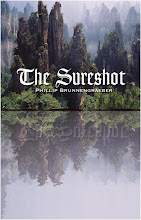One of my favorite Thanksgiving stories is when Samoset the first native to greet the pilgrims does so for the first time. I decided to recreate it in micro because I enjoy it so much. I don't know the names of the men Samoset met first so I will guess. Enjoy.
It was a warm and inviting day in March, a welcomed condition given the difficult winter the pilgrims endured their first days in their new home, Plymouth. The Pilgrims were busy with their daily tasks: gathering wood, tending to soil, preparing what meager meals they could, mending and building structures. The main structure, the church, stood as a monument to God's Providence in their lives. Unwelcome in their own homeland they sought a new chance. God gave them that opportunity, as he does when a person is saved, they were given new life.
Their new home was beautiful, but foreign. Wild and untamed the land was nothing like the terrain they knew in England. It was lush but unpredictable; it offered life and threatened death. They survived there only by God's grace and they thanked Him constantly for it. Still, they looked for new assurance of his blessing so that they could rest knowing that they would not be erased from the world and forgotten like other colonies before them.
On this day just such a sign strolled into town. While everyone went about their work as they did every day a native of the tribe Abenaki walked down the only street in town as though the colony had always been there and he was welcomed their openly. The people stared in awe as this "savage" paraded alone past the homes that were strange to him in their rows toward the center of town which was of course, the church.
His name was Samoset, second in command in his tribe. He had a strong gait, striking long black hair, a mere loin cloth around his middle and he did not even bother to return the stares that the pilgrims gave him. Some hid their children though they could not be prevented from watching the visitor from windows and cracks in doors.
The men at last headed him off and halted Samoset before he entered their church which was clearly the main building. Samoset was on a mission to make contact with the leader of the colony, the normal diplomatic thing to do, but the pilgrims would have been horrified had a heathen entered their church. Once halted they sized each other up a moment—Samoset not intimidated by the Englishmen. Why should he be? He was in his land, though the pilgrims had moved in. He and his tribe had watched with interest as they erected buildings and suffered through the winter. Many thought they would not survive, as other "visitors" had perished in the new land. These somehow endured the winter, so they deserved to know who their neighbors were. With these motives, Samoset looked into the eyes of the English pilgrims and said something that shocked the socks off of everyone there, "Welcome."
Samoset knew English! He told them that they were in the land of a tribe that had died of plague a few years earlier so that none of the natives cared too much of the choice in their settlement's location. He wanted beer, having been given some by the fishermen who frequented the region and taught him some English. Samoset gave them a lot of information on the tribes nearby and later brought them Squanto, who would prove to be a gift from God because without him it is unlikely that they would have survived. The pilgrims gave the visitor gifts, a bracelet, a knife and a ring. This meeting is historic and momentous.
I am struck by the amazing events that surround the Plymouth colony. They believed that God guided them to their new home and that he watched over them carefully. Surely no other early settlement was as successful as this one, though it was not without challenges. As I celebrate Thanksgiving, the holiday that they inspired, I trust as they did that God is alive in me and has a plan for my life.


No comments:
Post a Comment